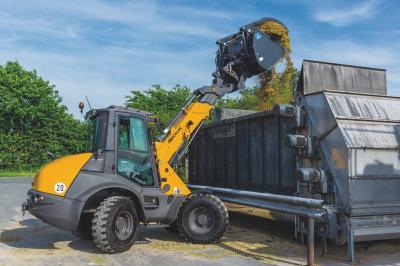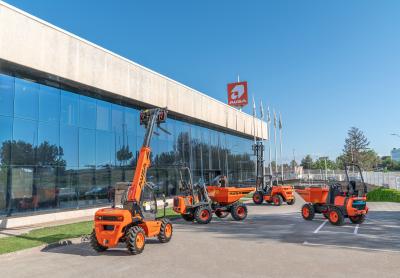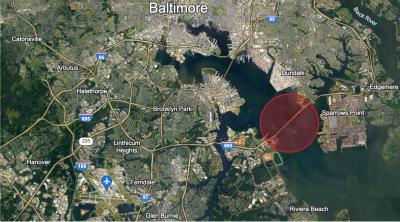Traditionally, construction sites were manually staked, with three workers pulling strings, verifying grades by walking the area and operating equipment. Construction companies hired equipment operators who had a lot of experience — the kind of guys who “run machines for a living,” said Chuck Harris, president of Benchmark Tool & Supply. Now, however, the focus is on technology, which allows companies to do the same work with fewer people — in particular, less experienced people.
As a distributor of machine control equipment, Benchmark Tool & Supply, based in Raleigh, N.C., contributes to that phenomenon. GPS and machine control “make an average operator very good,” Harris said, repeating a familiar adage. But the biggest advantage of machine control equipment is increased productivity with less manpower and machinery.
Catering to the survey, construction and engineering markets, Benchmark is one of North Carolina’s major suppliers of the industry’s best products, including some of the biggest names such as Topcon. Harris is particularly proud of three popular Topcon models: 3D GPS, the “standard” of the industry; the new 3D MC2 that helps dozers grade three to four times faster; and the 3D Millimeter, which guarantees millimeter accuracy and is especially well-suited for highways, airports and areas with tight tolerances.
Highway Help
Harris explained that Benchmark employees meet with clients to determine their needs and help them decide the best model for them. For Benchmark customer Blythe Construction in Charlotte, N.C., the choice was easy. Because the 50-year-old company interchanges equipment with its parent company, survey department manager Steve Brumbelow said they wanted to standardize all equipment to make things easier. Hubbard, in Orlando, Fla., already used Topcon, so the decision was made for Blythe.
Blythe may not have had a lot of input in the decision-making process, but Brumbelow said they’re pleased with Topcon equipment for a number of reasons. The company, which specializes in heavy highway work, has used GPS machine control since 2001. “But since we got the Millimeter, we’re really glad we’re Topcon,” said Brumbelow.
Blythe currently runs the 3D Millimeter and GPS on two graders and has the 3D MC2 on four dozers. Harris revealed that the company is “aggressive with buying more. We have six machines with GPS machine control now and plan to add three systems a year. We’ll invest $250,000 a year.”
Brumbelow likes to use it for data preparations and troubleshooting. Before they switched to Topcon, one grader and dozer ran an older system. “It was complicated to prepare files and set up a base station,” Brumbelow recalled. “You needed a computer programmer degree to run it.” Although he considers the Topcon system intuitive and easy to learn, he points out that “behind the scenes is more complicated because you have to reverse-engineer paper plans to a 3D model.”
“If there are any problems with the plan in the modeling process, they can translate to big problems on the jobsite. Everything shuts down while you make a decision how to fix a problem,” said Brumbelow. Fortunately, with Topcon, he said they’re able to handle 80 percent of issues behind the scenes before they go to a job site. “Catching those things before we get to the job avoids change orders and issues with the crew.” What pleases him is that “things are exactly like the plan shows. We’re within plus or minus one-half-inch with GPS and we get plus or minus one-quarter-inch accuracy with the Millimeter.”
Other benefits of using machine control systems include the ability to do jobs faster with fewer people. “Depending on the application, we can get up to a 50 percent increase in production.” A design-build job Blythe is working on in Monroe, N.C., is a good example. Crews are converting 11 mi. (17.7 km) of roadway from two-lane to a divided four-lane. At this interview, Brumbelow expected them to finish in November, which would have been three months ahead of schedule.
That kind of efficiency rate means better profits. “We bid some jobs using our regular production rates, but now that we’re using the Millimeter, we’re doing the work for half the cost. When the competition is bidding for less than cost,” Brumbelow said, “this keeps us in the game.”
Brumbelow explained that not only are smaller crew sizes more cost effective, but using fewer people to pull string lines and grade lines is also a safety issue. “Before, we used to stake every 50 feet. We had three guys on the ground pulling strings and measuring. Now, we stake every 200 feet. There’s one guy on the grader or roller. Nobody’s on the ground pulling strings.”
It was on another 11-mi. divided highway project they did three years ago in Denver, N.C., where they proved to themselves, the Department of Transportation and another contractor just how valuable Topcon’s system can be. The project was built in two phases: mass grading and then bridges and storm drains. Brumbelow said they averaged 50 percent production increases in paving and fine grading. Implementing Quality Control and Quality Assurance programs to record grades proved to the DOT the level of accuracy they obtained. Brumbelow summed it up in a few words: “less stakes, less labor-intensive. The DOT was satisfied.”
Profiting From Production
The other contractor on that Denver job was Propst Construction Co., Concord, N.C. The 75-year-old company focuses on soil stabilization, dirt work and utility work — predominantly storm water and sewer. Eight years ago they worked on the first stakeless job in N.C., a project to widen I-77 out of Charlotte. At that time, they had a different system. But the demonstration on the Blythe Construction job in Denver changed things.
“We were comparing tools,” said Jason Cuneo, superintendent of stabilization, grading and reclamation. “We looked at ours and at Topcon. Both were close, but Topcon had a little more equipment on the market.” Because they were impressed by what Blythe showed them Topcon could do and because they do a lot of work with Blythe, they opted to go with Topcon. “We like to have the same system because it dips into our pocketbook if we have to build our own models,” Cuneo added. Interchanging machinery is easy because all Topcon systems are backwards and forwards compatible, with free software upgrades.
In March, Propst installed Topcon 3D Millimeter on a motorgrader for fine grading work. Cuneo expects it to pay for itself before the year is out. Harris said “identifying the return on investment is a hard number, but it’s quick. It’s quick because it eliminates excess manpower. Since there’s no need to verify grade, three guys are freed up to work on other tasks. It also reduces fuel consumption because fewer passes are needed.”
“It’s worked out well,” Cuneo stated. “It pushes up production.” Since they started using the Millimeter, Propst has been able to cut two employees – string line pullers – and even a surveyor. “We did a finish grading job for Hinkle Chemical Co. that was totally GPS. We surveyed it ourselves and put it back on grade. We didn’t have to pay a surveyor.”
The ability to cut crew costs and gain production in a day has made Propst more competitive on bidding jobs, including jobs for the DOT, which “still does stake work.” But Cuneo said they download the grades and email them to the DOT. “That way, there’s nothing to hide, nothing to cheat, no doubt. We’re going off the same points on the job.” It also helps on private jobs by storing data, he added.
That kind of reliability has been an unexpected asset. Explaining the time limits they work with because Portland cement must get graded within four hours, he recalls that “other companies’ electronics would go out halfway through a job,” compromising the work.
On-Call Reliability
Both Cuneo and Brumbelow reported that Benchmark provides dependable support, although neither has had many issues. When problems do arise, Benchmark offers onsite service technicians, although Harris noted that service calls are not common. “Mostly, we get phone calls.”
“We don’t call Benchmark much, but they always have an answer,” Brumbelow interjected, adding that they even share input for the benefit of Benchmark’s other customers. The biggest hurdle he’s had to overcome is trusting that the machine does what it says it will, although he said it doesn’t take long to overcome that hurdle.
Operators like it, Harris contended. “The plans and grade are on the screen in front of them so they don’t have to depend on anyone in order to do their work.” By way of example typical of the kind of reception the system gets, Cuneo mentioned a couple of his grader operators. The 25-year-old “loves it.” The 56-year-old “still likes the manual, but he admits this is easier, with less troubleshooting.” They also like the fact that one person can set it up.
Scheduling in-house classes makes training convenient and easy. Propst scheduled a one-day training session with Benchmark. “It was easy,” Cuneo recalled. “Our guys had it down in two hours.” They’ve been so pleased with the results — reduced equipment costs and better efficiency — that Cuneo said Propst is looking at more systems for the grader and other machines. “We’re looking at a long-term investment. At nearly $200,000, it’s not cheap — but it’s worth it.”
Today's top stories















